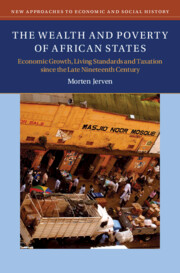 The Wealth and Poverty of African States
The Wealth and Poverty of African States Book contents
- The Wealth and Poverty of African States
- New Approaches to Economic and Social History
- The Wealth and Poverty of African States
- Copyright page
- Contents
- Figures
- Tables
- Preface
- Acknowledgments
- Introduction
- 1 A New Economic History for Africa?
- 2 Seeing Like an African State in the Twentieth Century
- 3 New Data and New Perspectives on Economic Growth in Africa
- 4 State Capacity across the Twentieth Century: Evidence from Taxation
- 5 Wages and Poverty: From Roots of Poverty to Trajectories of Living Standards
- 6 Conclusion
- Appendix to Chapter 3
- Notes
- Bibliography
- Index
2 - Seeing Like an African State in the Twentieth Century
Published online by Cambridge University Press: 06 January 2022
- The Wealth and Poverty of African States
- New Approaches to Economic and Social History
- The Wealth and Poverty of African States
- Copyright page
- Contents
- Figures
- Tables
- Preface
- Acknowledgments
- Introduction
- 1 A New Economic History for Africa?
- 2 Seeing Like an African State in the Twentieth Century
- 3 New Data and New Perspectives on Economic Growth in Africa
- 4 State Capacity across the Twentieth Century: Evidence from Taxation
- 5 Wages and Poverty: From Roots of Poverty to Trajectories of Living Standards
- 6 Conclusion
- Appendix to Chapter 3
- Notes
- Bibliography
- Index
Summary
The statistical records that have been collected, systematized and synthesized here provide a quantitative basis to challenge and shape existing narratives on African economic development from the nineteenth-twentieth centuries. However, the history of counting and registering people is as old as documented history – with taxation, it is a central part of a state’s effort to govern. The word “statistics” itself derives from “state” and statistical records are primarily the historical footprint of states. We see what the states knew about themselves, what they cared to find out, and their chosen projected image. In this chapter, we give an overview of the history of census taking in Africa, and further evaluate the basis of the architecture of knowledge that colonial and postcolonial states have left behind. It is particularly important to clarify what kind of questions the state records can answer, and where other evidence sources will have to be used, as this chapter sets the ground for the empirical analysis presented in the three following chapters. The chapter concludes with a view toward further research, in particular the use of other data sources, to expand “new economic history” beyond the colonial period and the use of the colonial records.
Keywords
- Type
- Chapter
- Information
- The Wealth and Poverty of African StatesEconomic Growth, Living Standards and Taxation since the Late Nineteenth Century, pp. 39 - 62Publisher: Cambridge University PressPrint publication year: 2022
